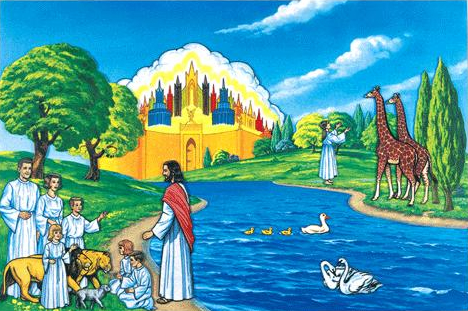Heaven Will Be the Happiest Place on Earth
This world is full of fake-Heavens.
Or, more positively, it’s full of imaginary versions of Heaven that give us partial glimpses of the future Heaven’s joys.
But either way, I feel these fake-Heavens sometime serve us better as reminders of what Heaven is not.1
For example, for one of the most infamous fake-Heavens in the world, see The (increasingly Borg-like) Walt Disney Company. The other day a friend sent me this advertisement for the Walt Disney World theme parks’ upcoming event. They’ve called it, rather cultural-appropriatingly, “Joy Through the World.”
 This at once makes me feel two emotions.
This at once makes me feel two emotions.
First, I do feel a little whimsical and genuinely happy.
That’s because I still fondly remember a Disney character–themed Christmas sing-along cassette (or was it a VHS?) tape that included the song “Joy to the World” with nary a lyric censored. I also have plenty of positive Walt Disney World memories, similar to the ones Mark Carver shared in his recent article “Just Imagine…“.
It’s okay to affirm those good things—not to mention the real creativity and engineering mastery on display at well-run theme parks.
We must deconstruct fake-Heavens.
Second, however, I also feel a sense of annoyance.
As a fake-Heaven, Walt Disney World is just not the best. Unless your version of Heaven costs thousands of dollars for a few days’ of vacation, not including lodging or dining. And includes wanton consumerism, sweltering days, potential for literal and figurative headaches, and of course the infamous waiting-in-lines, even for theme-park pro commandos (such as I have been).
Nah. My best fake-Heaven is a bit more homebound. It has lots of family, great food, and beautifully hostile and cold weather outside that will keep you inside. Christmas is probably going on. And no one ever suffers long work hours, or car breakdowns, or Drama.
Well, just describing the fake-Heaven aloud is sufficient to deconstruct the thing. And deconstruct we must, lest we end up in idolatry or false idealism. Walt Disney World costs hundreds of dollars, minimum, for one person. And those otherwise wonderful family Christmases must still come with some disclaimers (which, pleasantly, forgiveness and flawed human memory can clear up by next year).
Our conclusion: Any “perfect world” here, in this groaning era (Romans 8:22), cannot satisfy the human longing for a perfect place—a Place that is at once perfectly cozy, yet exciting; a place that is somehow perfectly Home, yet also an adventurous Out There.
But don’t deconstruct the real Heaven too!
At the same time, I wonder if we take this “deconstruct the idol” impulse too far.
I mean that this rightful impulse—to tear apart the idol and show it for a fraud—goes all wrong when we try to apply the same policy to the genuine article.
Here’s one example: Some people (including our anti-heroic “exvangelical” apostates) are wholly biblical when they deconstruct abuses in the Church. When critics of Christianity point out how bad leaders co-opt the system to teach false doctrine, or spiritually/emotionally abuse other people, this is a good deconstruction. However, they then get hooked on this habit of deconstruction. They start pulling apart not just Scripture-twisting, but Scripture itself, and they can’t stop at yanking off the terrible ’70s wallpaper off the church walls without also deciding to yank down the whole pulpit, instruments, pews, and sanctuary walls because it’s all idolatry, right? and so it’s all got to go yesterday.
Now, coming back to Heaven: sometimes, when we (rightly) deconstruct fake-Heavens, we might accidentally also start tearing down the real Heaven.
How so?
These three examples sound a little cliche to me, but they’re still common among well-meaning Christians.
1. “Heaven will be beyond what we can imagine.”

This classic flannelgraph still shows a more biblical image than some modern “grown-up” ideas about the New Earth.
To be sure, there’s some truth to that. Our God is so miraculous and epic and incredible. So it really does seem silly to suggest that Heaven will look exactly like the Earth we see around us, only with the bad parts cleared out.
At the same time, Scripture insists so often that we imagine Heaven in earthly terms, including images of like fields of crops, vineyards, kings, cities, and even products of human culture (see Isaiah 60, 65–66; and Revelation 21).
So, while many (well-meaning) Christians are off issuing disclaimers about these images, Scripture doubles down and even labels this eternal state, in both Old and New Testaments, the New Heavens and New Earth. How much more “earthly” can you get? What else would Scripture need to do to persuade us that the New Heavens and New Earth includes, in some way, an actual and physical Earth-made-new?2
2. “We might not remember our lives in Heaven.”
 Mark Carver on Wednesday phrased this idea plainly:
Mark Carver on Wednesday phrased this idea plainly:
All pain and sorrow will be forgotten and God will be the joy of our existence. We don’t know if this means we won’t know one another in eternity, but there will be no memory of past hurts or sins. Every moment will be pure joy in the presence of God.
I’ve thought about this long-running Christian idea for a while, and I’m not sure what it means to deconstruct.
Do people idolize their lives here? Sure. Could memories (bad or good) in this era distract us from worshiping God? Most assuredly.
Yet this is not how the Bible treats human memory—or any good gift that God has given us.
In our Old-Earthly lives, Jesus is changing his people into his image, even using suffering and trauma. Will these memories be wiped?
The Old Testament saints and New Testament apostles have their parts in God’s story immortalized in God’s eternal written word. Will their memories be wiped? Will the apostles Paul and Peter have to re-learn about his own sufferings and beatings by reading their own letters?
Jesus himself will, it seems, carry the scars from His crucifixion. Will our memories of the gospel reason why he suffered also be wiped?
I think Christians mean to honor the biblical texts that say “the former things shall not be remembered or come into mind” (Isaiah 65:17) when they suggest these memory-wipe concepts. But our interpretations of these verses, which pull in ideas of “we won’t remember our suffering,” stray too far from the Bible’s constant emphasis on God’s use of suffering as redemptive and eternally significant.
So, again, this seems an unnecessary deconstruction not just of a fake-Heaven, but of the real Heaven.
Anyhow, I think we have better answers for these texts—which seem instead to say that God will remove every immediate suffering or consequence.3 Revelation 21:4 says Christ will “wipe away every tear from [our] eyes.” It does not say that he wipes our memories so that we would not have even been shedding tears in the first place.
3. “Heaven is described as a bright city and that’s all.”
 Finally there’s the issue of our guiding image for Heaven. Revelation 21 presents this image as a glorious golden city that “[comes] down out of heaven from God” (Revelation 21:2). Mark Carver in his article suggests this city represents Heaven in totality, and suggests:
Finally there’s the issue of our guiding image for Heaven. Revelation 21 presents this image as a glorious golden city that “[comes] down out of heaven from God” (Revelation 21:2). Mark Carver in his article suggests this city represents Heaven in totality, and suggests:
This seems to be in contrast with how God’s creation was originally set up, with man and woman living in a garden to cultivate. It seems like a poor use of the world’s space to corral everyone into a city, especially with no more sea.
Whereas the city—real or metaphorical—is pretty clearly a subset of New Heavens and New Earth. A few questions flush this out:
- If the city comes down from heaven from God, where does it “touch down”?
- If the city represents Heaven in totality, how can “kings of the earth . . . bring their glory into it” (Revelation 21:24)?
- Why even reference a “New Earth” if there is no longer any physical planet earth?
- Why would Old Testament prophets constantly reference eternal versions of real-world locations in Israel?
- Finally, why would Paul in the New Testament promise “the creation itself” will be set free from its enslavement (Romans 8)?
I think this also explains the apparent biblical contrast that Mark notes between garden and city. Biblically, gardens don’t go away. They’re still out there: within the city, and outside the city. Because that heavenly city (again, real or metaphorical) isn’t all of Heaven in totality. It’s either one symbol, or one literal place, within a greater and literal physical paradise: the New Heavens and New Earth.
Deconstruct fake-Heavens, but construct the real Heaven biblically.
By “New Earth” this we mean a real Earth, this-actual-Earth-made-new.
It will have other cities, gardens, mountains, other natural wonders, rivers and oceans, seasons, and ongoing human culture and technology and science and God-glorifying art—oh, and a vast unexplored yet equally redeemed universe of stars and planets beyond.
Christians may certainly discuss the details. (Such as my inclusion of oceans and mountains in the above list, which I can defend.)
But I think we ought to agree that it’s healthy and even commanded to construct our Heaven-images biblically.
I also think we ought to do away with this pseudo-spiritual nonsense of “it’s bad to imagine Heaven” (when Scripture encourages us to), or “Heaven will be so unlike Earth” (when Scripture constantly describes eternity in Earth-like language). These are not healthful or biblical deconstructions of idols. In fact, they’re deconstructions of truth that do real harm to our biblical worldview and imaginations today.
So let’s deconstruct fake-Heavens and all idols, to be sure. But let’s also deconstruct bad deconstructions. Then let’s get to work constructing real portrayals of Heaven—that is, the New Heavens and New Earth—not from our own wishful thinking, but from Scripture itself.
- I feel inspired to take on this topic thanks to Mark Carver’s article last week “Just Imagine…“. This article serves as a part-rejoinder, part-rebuttal. ↩
- Scripture does occasionally seem to speak about physical features (which the Earth needs to go on being Earth) being removed, such as the sun and moon (Isaiah 60:19–20). But these texts are pretty clearly referring to (1) the environment inside a city (actual or metaphorical) within the New Earth, (2) the metaphor or reference of some physical feature no longer being necessary for eternal residents because of God’s very presence, or a change in the Law’s efficacy. ↩
- See one of Randy Alcorn’s responses to this question here. ↩







































As far as remembering the past without it being too much of a hurtful distraction…it’s already somewhat like that for some people on earth now. Like, I technically remember important bits from my past, but a lot of the sensory and even emotional information is missing. A lot of times I just keep going on without thinking about it much, unless something reminds me. The past is a useful tool and a lesson to draw from, but doesn’t have much importance other than that outside it being part of one’s identity and stuff. But that’s my perspective as an INTJ. INTJs remember things, but they are very future oriented and just don’t worry about the past so much except maybe a few rare things that trigger them. But if an issue is no longer a problem an INTJ is less likely to care about it.
So, if we had memories of our old life in the New Heaven, it could be a variation of that. Like, we might remember our past lives, but not really think about them much. Or if we do, even the worst memories might cease to hurt because they will never be an issue again. It may even be a reason for us to feel more worshipful because we are grateful we don’t have to go through that stuff anymore.
Kind of made me think of this song:
Think about these lyrics:
‘Heaven’s not enough
If when I get there I don’t remember you’
I wonder if the way we discuss and think about Heaven and the New Earth tends to make it sound more shallow, boring, etc. than it actually would be.
Not saying that we would definitely have to remember our pasts and face hardship to be happy with heaven, but it is worth considering that remembering and facing challenges could still be important for attaining fulfillment there. Does wiping all our tears away mean that we literally lose the ability to feel sad? Or does it just mean that we don’t feel it in a way that leaves us in agony?
Like, stories make us feel sad, but we want that sometimes because it gives meaning to the tale. But that’s very different from feeling sadness, anger, etc right in the middle of a crisis.
I’m of the opinion that the end state is the same as the beginning state in Eden. A physical existence with perpetual life. We will (I believe) eat and poop in paradise. We won’t die, we will have no sin nature, and we will have joy. But there will still be gradations. That’s my opinion. It’s also my opinion that plants and animals died before the fall. Otherwise, how could Adam and Eve eat plants? And what did they have to tend? And if animals never died, it would quickly become overpopulated. God never said the world was “perfect” in Genesis. He said it was “very good.” And the change at the fall was that Adam and Eve had experiential knowledge of good and evil (which existed prior to their experience of it–the serpent an example), and that there was INCREASED pain, not that pain started to exist at that point. I think a lot of our ideas are going to be broken open when we die and start our new life. I agree with Tolkien, “Not all tears are an evil.” God will wipe them away just the same.
Honestly, I like that a lot better than some narratives I heard growing up and sort of suspect it’s like what you said. But I’m not someone that’s obsessed with perfect comfort and complete avoidance of hardship. It is a little more difficult for me to imagine a world where those things don’t exist at all.
Agreed. I honestly think that when Revelation says there will be no more death or mourning, weeping, crying, or pain, it might be just talking about no more crying weeping, mourning, or pain over death and evil. Can’t back that up in any way, but it seems to be a possibility. It does say, “The old order has passed away,” but we don’t really know what that means. We won’t until it happens, I think. Not with confidence, at least. Though we all have opinions. 🙂
Have you seen the animated short Adam And Dog? There’s a bit of nudity in it since it’s about the Garden of Eden. But it’s a very beautiful, fantastical look of the Garden from a dog’s perspective:
Very cool. Never seen that! I’m actually writing a novel titled EDEN, right now, which is basically Adam’s life from his first-person perspective (to replace the book CAIN in the series I’ve been slowly adding to). So this is top of mind atm… 🙂 Thanks for sharing.
You’re welcome 🙂 Good luck writing 🙂
Brennan, I don’t find it hard to agree the Garden of Eden was sinless but not otherwise “perfect.” Yet I think the New Earth is portrayed very differently than Eden, though some things are the same.
First of all, it will be the place of a crystalline city, shining in splendor and glory. Eden wasn’t like that. Second, the Bible clearly says there will be no more tears–no such promise was ever given to Eden–though maybe because it wasn’t needed. Third, the Bible says Adam was to tend the garden but the Bible has no commandment to tend the New Earth. Perhaps they will, but it’s not stated.
Perhaps animals in the New Earth will continue to die–or perhaps not. Perhaps people will poop and live an otherwise familiar physical existence. Or perhaps not. It’s really hard to be sure.
Of course I notice you recognize that, which is why you used the word “opinion.” But your opinion is based on a parallel to Eden which I think isn’t quite as strong as you see it.
That’s actually refreshing to hear. I’ve had so many conversations with pastors, and others, who simply refuse to affirm that the Bible never teaches Eden was perfect. I’d agree with you that the New Earth is portrayed differently than Eden.
Still, the rest of Scripture affirms the return to the Edenic state quite frequently–I’m not taking that to mean it will be a return to actual Eden. Even Revelation affirms the return to the Edenic state with reference to the tree of life. Obviously there will be differences because it will be a “new earth.” So, new place, but same state. The symbolic focus in Revelation is on a new Jerusalem rather than strictly the garden motif. Again, what you’re referencing could all be symbolism. Looking at the rest of Revelation’s symbolic focus, it seems quite likely that it’s heavily symbolic. But we ARE promised elsewhere in Scripture that we will be given bodies that will eat, as Christ’s body ate after the resurrection. If you eat, why wouldn’t you poop? I suppose God could surprise me here, but I doubt he has a different plan. After all, he’s the one who invented pooping. Just seems like a gnostic bent to refuse to admit God could have us pooping in paradise, and I’ve grown pretty weary and leery of Gnosticism in the church. In Eden, Adam and Eve walked with God in physical form (they heard his footsteps). That was the original plan. Intimacy with God in spiritual, emotional, and physical form. If God is redeeming all things, it stands to reason that the old order (which I take to mean the rule of sin and the necessary separation between our spiritual and physical experience of God’s redemption) passing away will reveal a bit more holistic looking paradise than we normally envision when we think of heaven.
Have you read the book, “Heaven” by Randy Alcorn? It’s such a wonderful book. Definitely one of the three books I’d take with me if ever stranded on an island for the rest of my life.
I definitely have read it, several times, and narrowly avoided yet another string of references to that book in this article!
The Song of Songs invites us to intensify our desire for sex and play. The by-product is to increase our desire for an Edenic sexuality that will only be fully possible in the new heavens and earth.
This of course brings up the question of whether there will be physical sexual activity in heaven. Why would we think that a divine gift as enjoyable and pleasurable as sex would be lacking in heaven? Isn’t the point of the Resurrection and the new creation to restore all that has been corrupted by sin and death?
We differ more by degree than by kind. I’m not sure it’s really worth commenting, but I will.
“Heaven” is in the sense you mean it “where the visible presence of God is located.” Revelation says that will be inside the New Jerusalem, the place with the streets made of “gold” but which is transparent like glass, which has foundations of gemstone colors and gates that appear to be made of a single pearl and a bright shining light that emanates from the center. The city is also immense, of a size that should collapse under its own gravity, if gravity is the same–but it doesn’t.
Note the New Jerusalem will never be on Earth as we know it. It will be on a new, recreated Earth. So the title of your post is a bit wrong on a technicality.
Note also that the New Jerusalem isn’t very much like the old one. Both had people and gates and a temple and both were centers of worship of God–but very little else can be seen as the same. New Jerusalem is MUCH larger, much more crystalline, much more beautiful and shall we say it? Much more “magical.” (In a good sense.)
The New Jerusalem will sit on the the New Earth and not the old Earth. How much like the old Earth will the new one be? The Bible does not describe the New Earth in detail, though it offers two specific details–that there will be no sea (I think that’s a reference just to the Mediterranean, but I’m not sure) and there will be no more sun. You take neither of these descriptions as literal based on things you’ve said in the past and rather seem to see the New Earth as being pretty much the same as the old Earth, except for sin being removed.
I think it’s highly likely that the New Earth will be as different from the old one as the New Jerusalem is different from old Jerusalem.
So, in essence, the point number 1 you seek to de-construct, “Heaven will be beyond what we can imagine” you’ve got backwards. To explain what I mean by “backwards,” let me quote what you say next: “To be sure, there’s some truth to that. Our God is so miraculous and epic and incredible. So it really does seem silly to suggest that Heaven will look exactly like the Earth we see around us, only with the bad parts cleared out.” But then you point out that the Bible encourages us to see heaven in earthly terms.
Actually, I would say the best available evidence says that there is “some truth” to the idea that we can imagine heaven in part. Parts have been revealed. But we have every reason to believe that the parts that are revealed are not the whole story, just like the New Jerusalem is in fact massively different from old Jerusalem–which is itself reason to suspect the New Earth and the new universe will be very substantially different from the old one.
But as I already said, I’m differing with you by degree more than by kind…
There also seems to be a differentiation between heaven and the new earth. Revelation is highly symbolic, and parsing apart what should be taken literally takes a lot of assumptions. I think that’s why no one fully agrees with any other person on the exact details of Revelation.
But the rest of Scripture strongly affirms the physicality of the paradise we’re destined to inhabit. I’m guessing we can easily agree that it will be both wonderful and physical.
Brennan, I agree it will be physical. But I’m willing to think “physical” in that future may be substantially different than the physical we know.
Yeah, you’re right, it very well might be! I just personally feel more comfortable thinking conservatively about it.
I feel more comfortable thinking expansively! I find the idea of an already-known heaven rather boring. 🙂
I don’t think Christ is ever boring. 😛
Yet Christ did things his disciples never expected–in fact, frequently if you look at the interactions between the disciples and Jesus. Which I think is part of why C.S. Lewis in his analog of Christ said that Aslan is “not a tame lion.” Christ does things we would not expect and calls on us to do things we would not expect, either.
Nor should our expectations for eternity be “tame”!
The Song of Songs invites us to intensify our desire for sex and play. The by-product is to increase our desire for an Edenic sexuality that will only be fully possible in the new heavens and earth.
This of course brings up the question of whether there will be physical sexual activity in heaven. Why would we think that a divine gift as enjoyable and pleasurable as sex would be lacking in heaven? Isn’t the point of the Resurrection and the new creation to restore all that has been corrupted by sin and death?
I think commonplace speculations to “there is no sex in heaven” rest on inadequate accounts of the way God has designed humans for communion in and through the body, in all its parts.
It is for deeply theological reasons that I believe the denial of a transformed experience of sexual desire and delight in the life to come is inconsistent with the heart of the Christian gospel